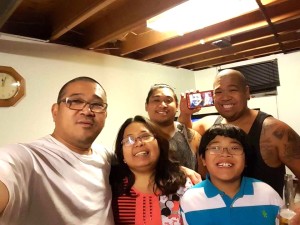Immigrant family celebrates Paskong Pinoy in Canada

Christmas at Balangatan household, with their mother, Helen, niece, Beverly, sister, Rosalinda and husband, Mario. CONTRIBUTED
SAN FRANCISCO — The snow falls heavily in Ottawa, Canada. It is minus-23 degrees and expected to drop in the coming days. The trucks and coaches service technicians of Transit Fleet Equipment Division of the city are on a round-the-clock shift in case city-owned buses need services.
Angelito Balangatan, 53, looks excitedly on his watch. It is only a few hours before midnight. His eight-hour shift as a technician ends at 11:00 p.m. By midnight he is at home with his family, celebrating the traditional “Noche Buena,” one of the Filipino traditions he has observed in Canada since he and his parents immigrated in 1983.
He comes home to familiar smells of arroz valenciana, pancit, bibingka, puto and kare-kare. A man in the adjacent room belts out “Sana Ngayong Pasko” in a karaoke. Outside the gate of the Balangatan residence, a big “Maligayang Pasko” is emblazoned on a tarpaulin.
“There is no Christmas like the way we celebrate it in the Philippines. In Canada, you cannot feel it the next day. I have to work on the 26th, Boxing Day,” Angelito says.
White Christmas
In 1983 the age limit to become a dependent in Canada was 21. Angelito was 20 years old when he and his parents arrived on May 31, 1983. The petition was not stiff during that time. His sister, Rosalinda, was petitioned by their aunt in 1974. The process took less than a year. When Rosalinda became a naturalized citizen, she petitioned her fiancé first, Mario.
“My first winter in Canada was fun at first. But when the temperature dropped to zero it wasn’t. I was working in a gas station. To ease our homesickness, my parents continued the traditional Noche Buena with all the foods we used to eat in the Philippines. Even if we had work the next day,” Angelito chuckles.
The tradition continues through the years in their own families. Angelito is married to a Filipina, Marilou, who loves cooking, to the delight of Filipino Canadian friends and relatives who cannot yet afford to spend the holidays in the Philippines.
Filipino heart longs to be home
During the holidays, workers are paid higher if they work 20 hours in a day. Angelito, works 40 hours per week on regular days, with overtime pays and paid sick leave. As Canadian citizen, he is also entitled to a 5-7 week paid holiday.
“I am 100 percent Pinoy. I am only Canadian by papers. I wish I could go home every year. But the airfare is more expensive. Anyway, we have a large family here, so Christmas and New Year isn’t lonely after all,” Angelito says.
It was only in 1993 that he acquired citizenship because he kept on “forgetting” to apply. Angelito explains that he had mixed feelings when he changed his citizenship. Since he was an immigrant for a long time, he applied for Canadian citizenship. He then spent his first vacation in the Philippines.
“I lost something, but I gained another thing. Actually, it was for convenience. When I was renewing my passport at the Philippine Embassy, the officials asked for many documents including the payment of an 8-year income tax, which I failed to do,” he says.
But it was only in 2012 that his whole family spent Paskong Pinoy in his hometown in San Jose, Occidental Mindoro.
“It coincided with my 50th birthday too in January. The whole family was there. My youngest son was so excited seeing all the relatives back home. It was the longest Christmas he’d ever experienced. They particularly enjoyed New Year because of the fireworks,” Angelito recalls.
Angelito’s two elder sons AJ and Angelo speak Tagalog. Only the youngest, Andrei, who is 12 years old failed to learn the language despite trying to teach him. And they eat balut and tinapa too. In turn, he learned how to ice skate and ski to keep up with the kids.
Life as a Canadian and a migrant
Aside from adjusting to the weather in Canada, including harsh winters, Angelito has to endure discrimination from fellow Filipinos.
“Our English accent is really no problem to native Canadians. Filipinos discriminate us more when they hear fellow Filipinos speaking with thick accent. Filipinos must learn to speak the language wherever they are,” Angelito says.
Angelito says that technical courses like plumbing, mechanics and electrical are in demand. To acquire a license, he studied automotive mechanics again for two months to finish his apprenticeship. It took him five years to become a licensed tradesman. He holds two licenses as truck and coach technician. He says that skilled workers seldom get unemployed.
As a Canadian citizen, Angelito can vote and can cross the borders easily to the United States. He is also now employed by the government.
“Even as an immigrant, you can get health insurance as long as you have social security. But you cannot get work in the government,” he explains.
Angelito is now looking forward for his retirement. He plans to spend the winter months in the Philippines to experience Paskong Pinoy.
But for now he says, “Wherever you are, you can celebrate Christmas Pinoy-style as long as you spend it with your loved ones.”




